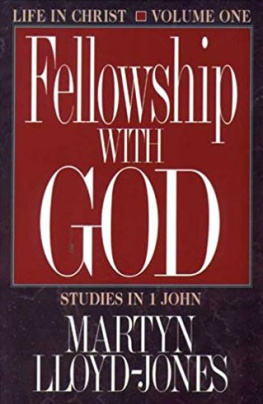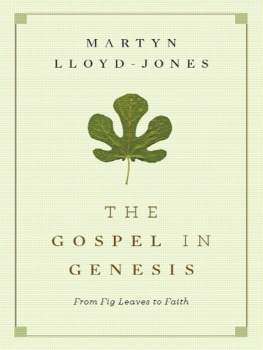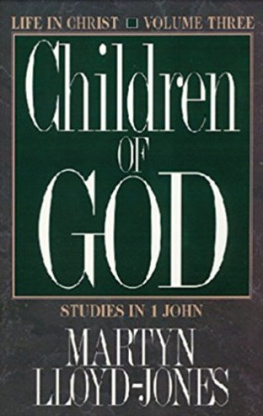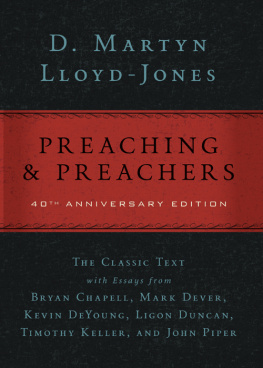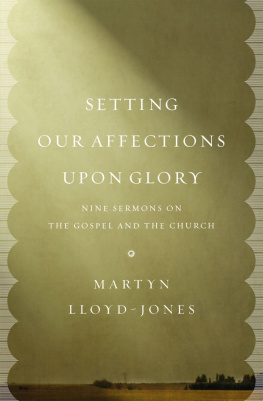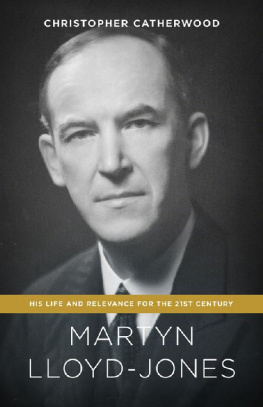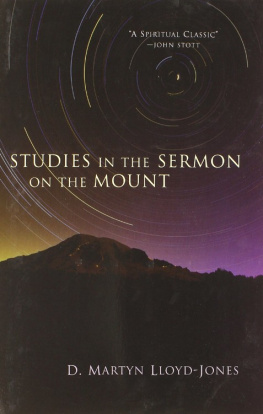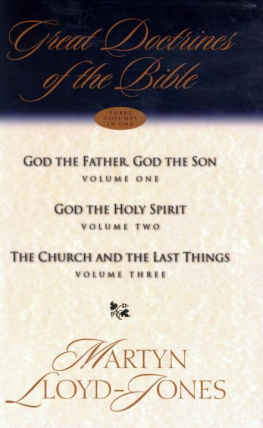David Martyn Lloyd-Jones - Fellowship With God: Life in Christ
Here you can read online David Martyn Lloyd-Jones - Fellowship With God: Life in Christ full text of the book (entire story) in english for free. Download pdf and epub, get meaning, cover and reviews about this ebook. year: 1993, publisher: Crossway Books, genre: Religion. Description of the work, (preface) as well as reviews are available. Best literature library LitArk.com created for fans of good reading and offers a wide selection of genres:
Romance novel
Science fiction
Adventure
Detective
Science
History
Home and family
Prose
Art
Politics
Computer
Non-fiction
Religion
Business
Children
Humor
Choose a favorite category and find really read worthwhile books. Enjoy immersion in the world of imagination, feel the emotions of the characters or learn something new for yourself, make an fascinating discovery.
- Book:Fellowship With God: Life in Christ
- Author:
- Publisher:Crossway Books
- Genre:
- Year:1993
- Rating:4 / 5
- Favourites:Add to favourites
- Your mark:
- 80
- 1
- 2
- 3
- 4
- 5
Fellowship With God: Life in Christ: summary, description and annotation
We offer to read an annotation, description, summary or preface (depends on what the author of the book "Fellowship With God: Life in Christ" wrote himself). If you haven't found the necessary information about the book — write in the comments, we will try to find it.
Fellowship With God: Life in Christ — read online for free the complete book (whole text) full work
Below is the text of the book, divided by pages. System saving the place of the last page read, allows you to conveniently read the book "Fellowship With God: Life in Christ" online for free, without having to search again every time where you left off. Put a bookmark, and you can go to the page where you finished reading at any time.
Font size:
Interval:
Bookmark:
the blood of Jesus Christ his Son (or, the blood of Jesus his Son) 1 John 1:7
It is the business of Christian preaching at all times, on all days and on all occasions, to be preaching Christ Jesus the Lord. But it is always good for us particularly and specially to remind ourselves of the facts and of the details lest we tend to assume we know them all, instead of constantly reminding ourselves of them. And here, in this one phrase, it seems to me we have a perfect account or epitome of the essential doctrine which is taught in the New Testament with regard to this great and vital subject the blood of Jesus his Son.
Now these New Testament epistles were never written merely for the sake of writing; they were never produced merely as literary effusions of men who were fond of writing or whose vocation in life was that of producing literature. These letters came into being because of a situation that arose in the infant Christian Church; they were written with pastoral intent, and that is particularly true of this first epistle of John.
John is concerned, as we have seen all along, about the vital importance of understanding the doctrine concerning the person of our Lord Jesus Christ. This is, in a sense, the thing that made him write at all. As we go on through this epistle in subsequent volumes we shall find that he makes frequent references to what he calls antiChrists, and he uses very strong language. He says that certain people who are writing about this doctrine are liars, and so according to John, it is very important that we should be perfectly clear, without any suspicion of doubt or of hesitation, with regard to the person of Jesus of Nazareth, the Son of God.
This is something that can never be emphasised too frequently; the whole case of the New Testament is bound up with this question. So it is something which we must constantly repeat, because it does seem to be the fatal tendency of mankind, even of the Christian Church herself, to divorce the teaching from the person. Yet the moment you do so, you have no real teaching. That is what differentiates this from everything else; it is not an idea or a proposal, nor is it a philosophy. It is the presentation of a person, without whom we have nothing at all.
I am not saying that there is no value at all in good, uplifting and moral teaching or that there is no benefit to be derived by society from the consideration of noble ideas and exalted conceptions with regard to life. That is all right, but it is just not Christianity. It has nothing to do with it, in a sense, and we can do no greater violence to the New Testament doctrine than to represent the message of Christs birth1 as but some vague general message of goodwill and of good cheer and happiness. That is not its message at all.
No, if we do not start with the person of the Lord Jesus Christ, if we are not absolutely clear about Him, then there is nothing. There is no good news, there is no evangel, there is no gospel; there is nothing to cheer us up, there is no hope. We are just living in the darkness of the world, and we are unutterably foolish in trying to persuade ourselves that things are better than they really are. There is no such thing, in a sense, as the Christmas spirit. That is not the Christian message; it is not a vague spirit; it is a message of news concerning Him, so that, therefore, we must of necessity start at this point and be absolutely clear about this matter.
As has often been pointed out, Christianity is Christ. It all centres round Him, and every doctrine that we have and every idea that we possess is something that comes from Him. Therefore, we must of necessity start with Him, and of course John in this letter has already done so. We pointed out, in dealing with the first three verses, that immediately he announced his message: That which was from the beginning, which we have heard, which we have seen with our eyes, which we have looked upon, and our hands have handled, of the Word of life that which we have seen and heard declare we unto you. He started at once with his doctrine, and it was the doctrine of the person. For the whole message which John has to deliver is, simply, that to us there is only one way of fellowship and communion with God, and that is because of the Lord Jesus Christ. It is He alone who can enable us to know this fellowship, for there is one mediator between God and men, the man Christ Jesus (1 Tim 2:5).
So if He is the essential link, if He is the only way of communion with God, how vitally important it is that we should be perfectly clear about Him! And as we saw in those first three verses, John immediately proceeds to correct certain errors that had crept in with regard to His person, even in those early days. We have heard, says John, we have seen with our eyes, we have looked upon, our hands have handled. And there, immediately, he is correcting heresy. Indeed, as you look at this epistle and go through it, you are at once impressed by the great fact, which he goes on repeating, that it is these various doctrines with regard to the person of the Lord Jesus Christ that always tend to be the greatest source of trouble in the Christian Church. So we must be clear about this; otherwise we have nothing whatsoever.
So here in one phrase he again gives the whole doctrine, and to me there is nothing that is quite so wonderful or charming, in the true sense of the word, as the way in which so often in the Scriptures you have the whole of the doctrine put in a phrase like this. These men repeat it; they never apologise for that, they were always preaching the same theme; it was always this wonderful person. They never got far away from Him because He was everything to them, and so they go on repeating their whole doctrine, and here is a phrase which says it all the blood of Jesus his Son.
What does this suggest to you? First of all it reminds us of the historical character of our faith. You see, our faith is concerned about the person of Jesus and there, immediately, we are in the realm of history. The Greek philosophers talk a great deal about their ideas. These began as great ideas up in the heavens; then these great ideas had somehow or another become incarnate, but it was all in the realm of ideas. They were always concerned about thoughts, and so much that still passes as Christianity falls into that ancient error.
Now that is corrected here, because we are concerned about Jesus, Jesus his Son; we are concerned about certain facts, and that is the great glory of our Christian faith, that it is something that is based upon a series of historical facts and events, and this very name, Jesus, reminds us of that. Jesus yes, the baby that was born in Bethlehem in a stable and placed in a manger; Jesus, an actual child that was born into this world; the boy Jesus arguing in the Temple, still right in the realm of history and of facts; a young man working as a carpenter, Jesus.
Then there were three years, the most amazing three years the world has ever known, when, having set out upon His public ministry, He travelled backwards and forwards, up and down that land of Palestine, preaching and teaching and working His miracles and dealing with the people. It is still solid history, yes, quite as definite as 55 B.C. when Julius Caesar conquered Britain; quite as real as 1066 and all other events of history Jesus a person and all that we know about Him, culminating in the agony in the garden and on the cross and in the burial and the resurrection and the ascension.
Now that is what we are concerned about; it is as real, as realistic as that. Oh! how can one put this so that it may be clear to us once and for ever that we are essentially concerned about something that has taken place in history? When unbelievers or people who tell us that they are not Christians come to us and would have us believe that we are misled or that we have gone astray in believing our Christian faith and gospel, when they come and deny our truth and faith, the real answer to give them is not, You can say what you like, but I have felt or experienced something. No, the real reply is history, the birth of the baby Jesus in the manger, and all the other facts that we have just mentioned.
Font size:
Interval:
Bookmark:
Similar books «Fellowship With God: Life in Christ»
Look at similar books to Fellowship With God: Life in Christ. We have selected literature similar in name and meaning in the hope of providing readers with more options to find new, interesting, not yet read works.
Discussion, reviews of the book Fellowship With God: Life in Christ and just readers' own opinions. Leave your comments, write what you think about the work, its meaning or the main characters. Specify what exactly you liked and what you didn't like, and why you think so.

